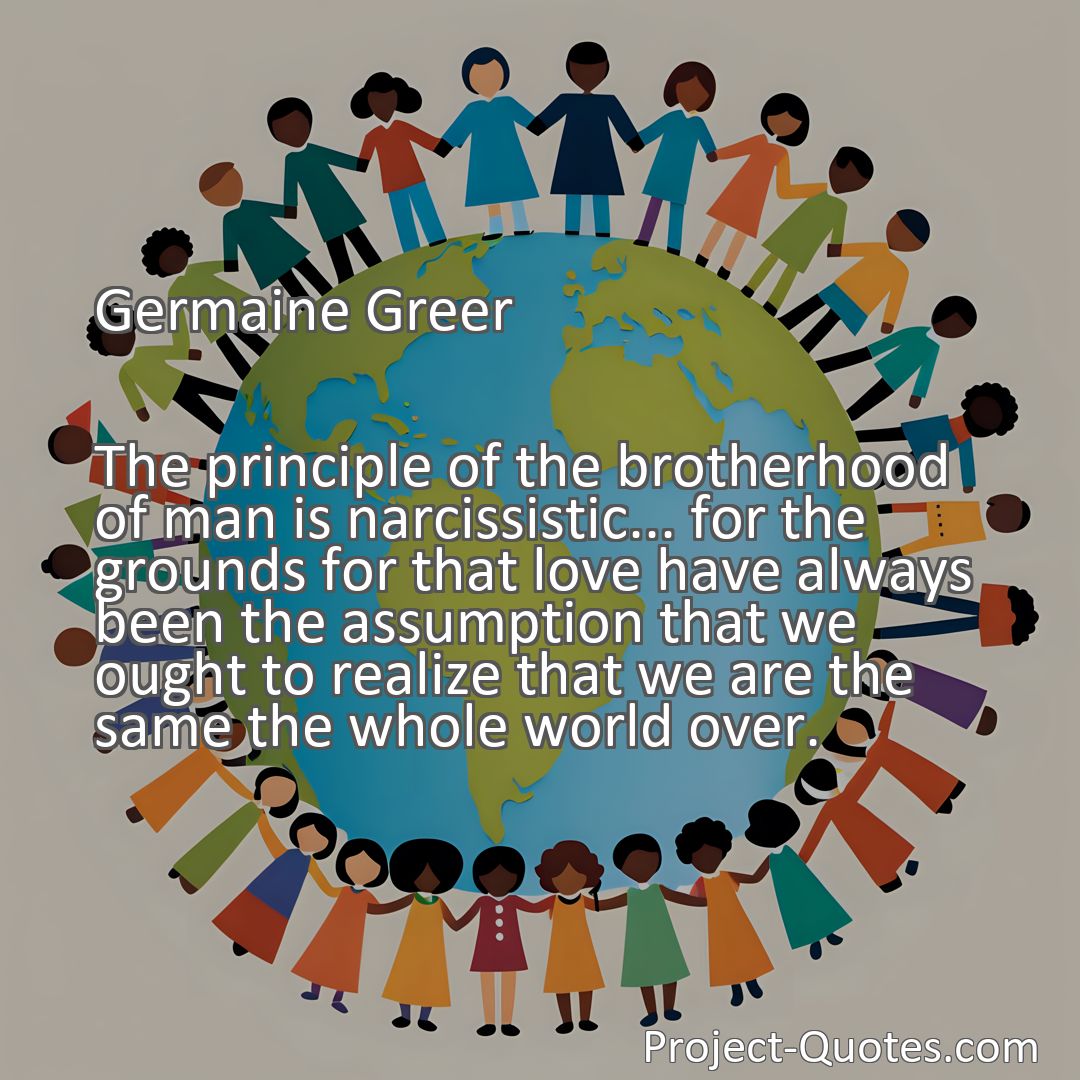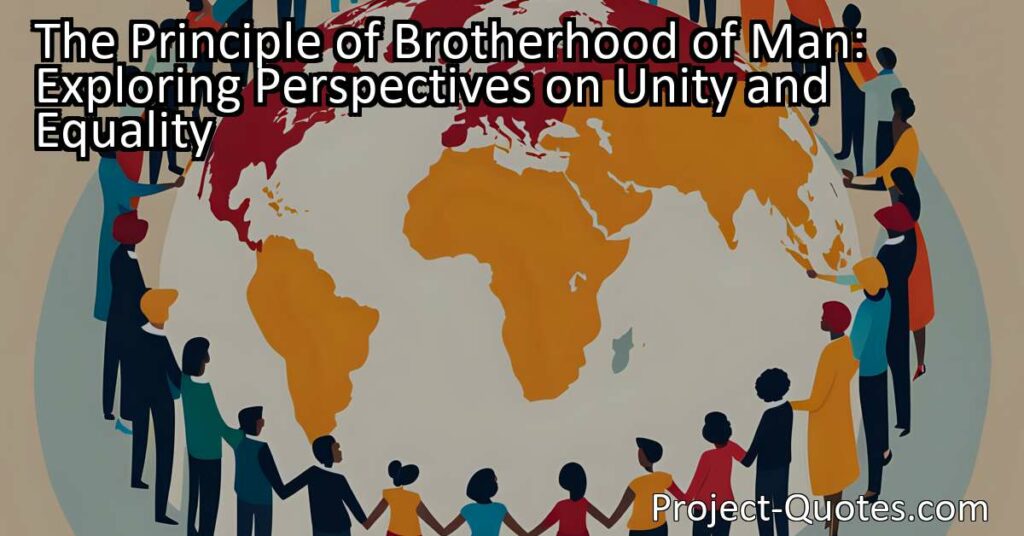The principle of the brotherhood of man is narcissistic… for the grounds for that love have always been the assumption that we ought to realize that we are the same the whole world over.
Germaine Greer
The principle of brotherhood of man emphasizes unity and equality among all human beings, promoting love and respect regardless of nationality, race, or cultural background. Some argue that this principle is narcissistic because it assumes we are all the same. However, embracing this principle encourages empathy, compassion, and understanding, leading to a more inclusive and harmonious society.
Table of Contents
- 1 The principle of the brotherhood of man is narcissistic… for the grounds for that love have always been the assumption that we ought to realize that we are the same the whole world over.
- 2 Germaine Greer
- 3 Meaning of Quote – The principle of the brotherhood of man is narcissistic… for the grounds for that love have always been the assumption that we ought to realize that we are the same the whole world over.
- 4 Freely Shareable Quote Image
- 5 Related
Meaning of Quote – The principle of the brotherhood of man is narcissistic… for the grounds for that love have always been the assumption that we ought to realize that we are the same the whole world over.
The principle of the brotherhood of man is a concept that emphasizes the unity and equality of human beings, regardless of their nationality, race, or cultural background. It promotes the idea that we should love and respect one another, acknowledging that we are all fundamentally the same. However, some argue that this principle is narcissistic, suggesting that it is self-centered and unrealistic to assume that we are all the same. Let’s delve into this thought-provoking quote and explore the different perspectives surrounding the notion of brotherhood.
At first glance, the principle of the brotherhood of man appears to be a noble and compassionate idea. It encourages empathy, compassion, and understanding among individuals, fostering a sense of collective responsibility for the well-being of all humanity. By recognizing our shared humanity, the principle suggests that we should treat each other with kindness, respect, and equality.
One of the key foundations of the principle is the assumption that we are all the same. This assumption serves as the basis for cultivating love and unity among individuals worldwide. It suggests that underneath the different external appearances, cultures, and beliefs, we share common desires, emotions, and aspirations. This concept has been integral in promoting peace, justice, and equality throughout history, inspiring movements for civil rights, social change, and global cooperation.
However, the quote suggests that this assumption of sameness is narcissistic. Narcissism refers to excessive self-centeredness and self-admiration. In this context, the critic argues that the notion of the brotherhood of man is self-centered because it assumes that we all share the same characteristics and experiences. This perspective challenges the idea that we can truly understand and empathize with others, as it implies a limited perspective that disregards the uniqueness of individuals and their diverse backgrounds.
To fully grasp the implications of this critique, we must examine the counterarguments and consider the complexities of human nature. While it is true that we are all human beings with common biological needs and emotions, each individual is also shaped by their unique experiences, cultures, and environments. Our distinct backgrounds influence our perspectives, beliefs, and values, making it challenging to completely comprehend the lives of others.
However, the principle of the brotherhood of man does not necessitate an absolute understanding of one another. Instead, it calls for empathy and compassion towards others, recognizing that our shared humanity is a basis for connection and solidarity. It does not require identical experiences, beliefs, or backgrounds but rather a willingness to acknowledge and respect the inherent worth and dignity of every individual.
Moreover, the principle of the brotherhood of man does not negate or diminish the significance of our differences. On the contrary, it celebrates diversity and recognizes the richness that stems from various cultures, customs, and perspectives. It does not demand uniformity or homogenization, but rather encourages dialogue, learning, and growth through the exchange of ideas and experiences. Embracing our differences can lead to a deeper understanding of ourselves and others, fostering a more inclusive and harmonious society.
It is essential to understand that the principle of the brotherhood of man is not a call for blind idealism, but rather a pragmatic approach rooted in empathy and respect. While it may be challenging to fully comprehend and relate to the experiences of others, this principle urges us to at least strive for understanding and compassion. By recognizing our shared humanity, we can bridge the gaps that divide us and work towards a more equitable and just world.
Furthermore, the principle highlights the interconnectedness of humanity. In an increasingly globalized world, our actions and choices impact not only ourselves but also those around us. The principle of the brotherhood of man calls for a sense of global citizenship, encouraging individuals to consider the consequences of their actions on a broader scale. It reminds us that by working together, we can address global challenges such as poverty, inequality, and environmental degradation.
In conclusion, the principle of the brotherhood of man, while an idealistic concept, serves as a reminder of our shared humanity and the importance of empathy and compassion. While some argue that this principle is narcissistic due to the assumption of sameness, it is crucial to realize that it does not require complete understanding or homogeneity. Rather, it promotes respect for diversity and the belief that by recognizing our interconnectedness, we can foster a more inclusive and peaceful world. By embracing the principle of the brotherhood of man, we can strive to bridge divides, promote justice, and build a better future for all.
I hope this quote inspired image brings you hope and peace. Share it with someone who needs it today!


